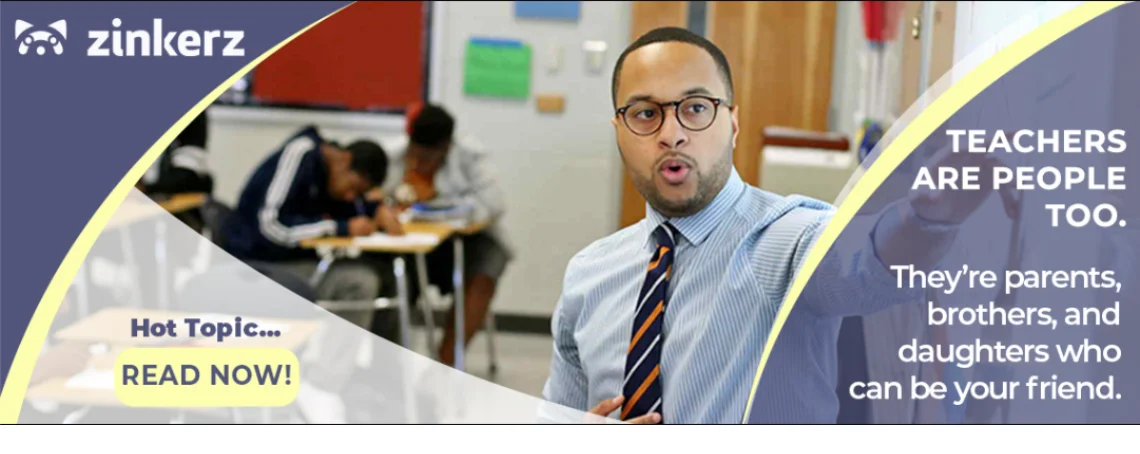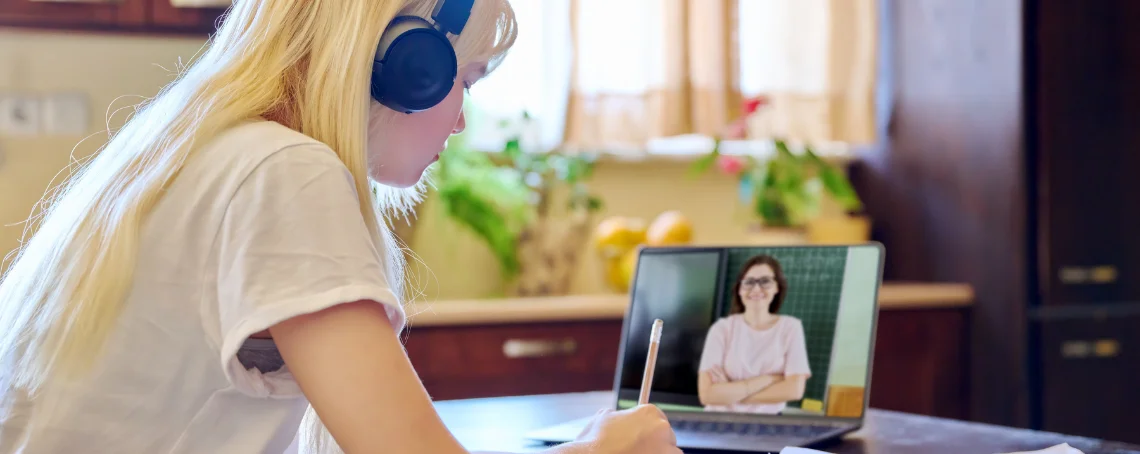Teachers are people too. They’re parents, brothers, and daughters who can be your friend.
Seeing a teacher at a restaurant while you’re out to dinner or seeing them rolling gutter balls when they’re a couple of lanes over from you at the bowling alley can be shocking. “What are they doing here?” you think. “Shouldn’t they be in class and grading our tests from last week?” It turns out that teachers are people too. They’re parents, brothers, daughters, and friends. They just know more about fractions, molecules, and wars than a nurse, carpenter, or accountant.
You spend anywhere from six to thirty hours a week with a teacher as a student. A lot of this time is spent listening to their lessons to try to achieve their level of knowledge and expertise in a subject. Still, this amount of time lends itself to creating fulfilling relationships and mentorships. Being in school can make it awkward to try to build a productive relationship with a teacher. They are authority figures, after all. When a cop pulls you over, your instinct is to follow directions, not to learn about their hobbies and interests, because they’re in a position of authority. Teachers can’t send you to jail, and education will be an essential tool for a student’s growth and maturity. So, in this blog, Zinkerz will give insights into how you can enhance your education by forming relationships with your teachers and professors.
Sports and Clubs:
Let’s start with an easy one. At most schools, you’ll be able to see coaches and advisors disguised as teachers throughout the hallways. Then, as soon as the last bell rings, the English teacher transforms into the golf coach, and the history teacher pulls off her mask to reveal a new identity as the leader of Model United Nations. If you’ve seen Glee, you know that teachers volunteer for these extracurricular positions. Whether it’s to vicariously relive their past through the club like Mr. Schuester or a deep interest in the topic or activity, your teacher is a part of this club because it’s something they love.
What club are you a member of? Is your algebra teacher also your soccer coach? Then strike up a conversation about whether Sadio Mané is the best player in the world or how disastrous the World Cup would have been if they had kept it scheduled for the summer in Qatar. If you stay after to get help with exponential growth and decay, your teacher can even re-word the lesson into a customized soccer lens that allows you to understand the topic better. Is your chemistry teacher also in charge of the NHS? When you’re at these meetings, you can talk about tutoring students at a local middle school about science and chemistry as a volunteer opportunity. Your teacher will love this idea and work to help you create this project. Boom, now you two are the best of pals!
Even though your teacher may spend the work day lecturing about Shakespeare or how King Tut didn’t do all that much as a pharaoh and is famous for his well-preserved tomb, they have extracurricular interests that match yours. How do you make any friends? Is it by quietly sitting in the corner of the cafeteria, or is it by engaging with other kids in the interests that you share? It’s the latter. Teachers are no different. You don’t have to join a club or team to appease a teacher, but joining a group that shares your interests means that you will be able to find a teacher who is passionate about your curiosities.
Extra Work After School:
Suppose you’ve gotten a 100% on every single assignment ever and can continue to do so by yourself; excellent. I don’t believe you when you tell me that, but keep up the superb work. As a student, we do not expect you to be an expert on every topic immediately. After one lecture, do you know all the nuances, intricacies, and the ins and outs of the French Revolution? Just one? I press X to doubt it. By saying this, I mean that we can all stand to get extra help and have further conversations about lessons to ensure that all the information is understood and absorbed.
Not only that, but teachers are also going to have great anecdotes about their subjects. Think of something you like—it could be movies. Is it more interesting for you to memorize how much Top Gun made at the box office or to learn which stunts Tom Cruise performed himself? Keeping the French Revolution as an example, staying after school and chatting with your history teacher one-on-one may lead to a conversation about Napoleon. Then they may tell you an exciting story like how Napoleon loved hunting, so his aides would catch bunnies and release them at Versailles for him to hunt via this contained cheat code. But, one day, the bunnies turned on Napoleon, and a mob of hundreds of bunnies chased him back to the palace. Imagine the ruler of France being harassed by rabbits like he’s Elmer Fudd. That’s not a topic that comes up in class, but staying after school and diving into a subject that the teacher is an expert on and a curious investigator in can build a relationship around these stories, add enjoyment to the class, and develop a passion for yourself in the field.
Staying after school and having a conversation benefits the student and the teacher. A one-on-one conversation is much more memorable than an assembly; the extra work will demonstrate a student’s care for their work while helping them improve in class. In the beginning, we pointed out how many hours are spent with a teacher. However, students rarely get to have private conversations during these hours. Taking a little extra time before or after school to hone in on a subject is highly recommended by us here at Zinkerz to create a productive relationship with a teacher.
Get Questions Wrong in Class:
This feels strange, considering the section above is about improving in class to grow a relationship with a teacher. Now we’re telling you to do badly in class? Not exactly.
Anxiety and shyness are detrimental to the prospect of growing a relationship with anyone, especially teachers. It can be scary to offer an answer or ask questions during class in front of the other students. Sure, that clique of kids you don’t get along with may notice and roll their eyes, but you’ll stand out to your teacher. Raise your hand. I got the answer wrong. Preferably, you’d get the answer right, but getting the answer wrong prompts your teacher to deliver further explanation in an impromptu conversation about the class.
Vulnerability is a great skill to have when it comes to learning about oneself. It’s arguably even more important to let others know where you are. Volunteering to answer a question takes courage as it opens a student up to be incorrect, but being incorrect may be better. This creates further dialogue and makes an impact on a student’s memory. So, when it comes time to take the test, you can think, “oh yeah, water is polar and negative towards the oxygen atoms because I answered that it wasn’t in class, and the teacher explained how the covalent bond works.”
Not only does getting questions wrong help students improve their knowledge in a class, but it also makes them stand out from the teacher. Your teacher enjoys explaining these topics and answering questions. Allowing them to do this will make you stand out as an engaged and responsible student. It’s not recommended to get questions wrong purposefully, but to raise your hand even if you aren’t sure of an answer or to ask a question. Do you remember a single time someone got a question wrong in class? I’d guess that you don’t. But, you will remember a conversation and an explanation from your teacher. And your teacher will remember the conversation, too, allowing a relationship to bud and flourish.
Parents and Guardians:
We’ve discussed how the student and teacher can build relationships to aid in the student’s education. But what about the rest of the family? When a student leaves school, the teacher no longer has an easy way to contact them. They have the freedom to get lost in their Xbox, their favorite show on Netflix, and their friends. At home, the parents are responsible for ensuring that their students reach their potential.
“How, though? I, as a parent, don’t know what’s being taught every day, and I’m certainly not an expert on Joseph Stalin, Belgians in the Congo, Watergate, or anything else Billy Joel mentions.“
We at Zinkerz recommend opening a line of communication with your child’s teachers. You don’t have to comment on all of their teachers’ Facebook posts, but occasional emails or phone calls to discuss a student’s performance will develop a sense of trust and familiarity between parents and teachers. Teachers are more likely to reach out when a student is struggling, talk individually with a child, and recognize difficulties in the classroom. It takes a village to raise a student, so parents should consider becoming more involved with their child’s academics.
In conclusion, as you can see, communication is the basis for creating a productive relationship with a teacher for both students and parents. This makes sense, as it’s challenging to develop a relationship with someone you’ve never spoken with. So, whether it’s through a shared interest, further insight into a subject, participation in class, or occasional check-ins for a student, opening communication and beginning conversations with teachers will be the best ways for a productive relationship to be created. Teachers are people, too, so don’t sweat it.



